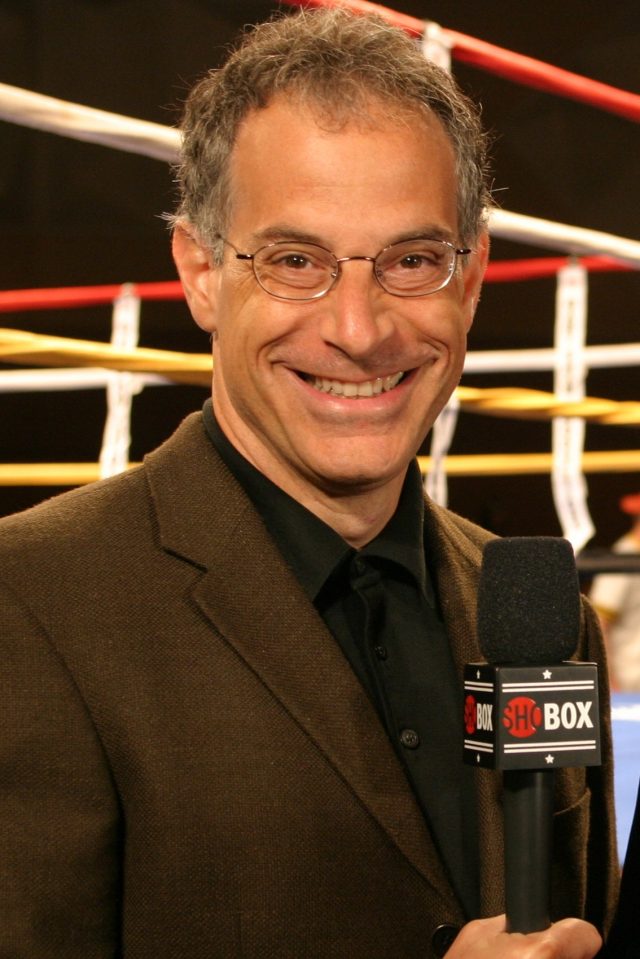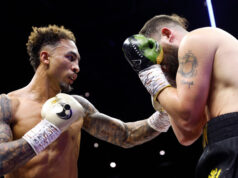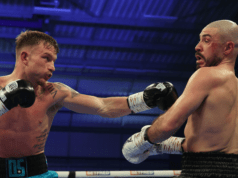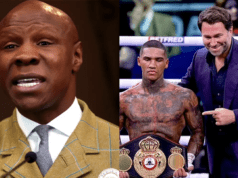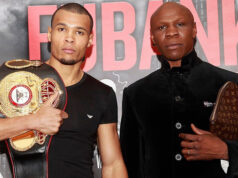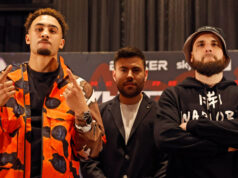Farhood’s Ranking of the 10 Most Significant Super Middleweight Title Bouts in History
By Steve Farhood
On December 17, every eye in boxing will be glued to the super middleweight battle between WBA titlist Andre Ward and WBC titlist Carl Froch, who will clash in Atlantic City in The Final of the Super Six World Boxing Classic.
The super middleweight division was born in 1984, when Scotland’s Murray Sutherland was crowned IBF champion. Since then, many of the greatest fighters of their generation, including Sugar Ray Leonard, Thomas Hearns, Roy Jones, James Toney, and Joe Calzaghe, have engaged in 168-pound title bouts.

Ward-Froch will be the 76th unification bout in boxing, and the sixth at super middleweight. Given the immense stakes, it will be one of the most critical contests in the division’s 27-year history.
To date, the 10 most significant super middleweight title bouts:
1. Roy Jones W 12 James Toney, November 18, 1994, Las Vegas (Jones retains IBF title): Those who insist Jones ducked the best available opposition conveniently choose to forget this fight. Toney, 44-0-2, is ranked second pound-for-pound, Jones, 26-0, seventh. Toney drains himself making weight, rehydrates until he is a bag of water, and performs accordingly. Jones scores a knockdown in round three en route to a clear-cut decision win.
2. Sugar Ray Leonard D 12 Thomas Hearns, June 12, 1989, Las Vegas (Leonard retains WBC title; Hearns retains WBO title): The legends are rematched eight years after their historic unification battle at welterweight. While both are past their primes, they produce a thrilling duel, with Leonard, 35-1, suffering knockdowns in rounds three and 11, and Hearns, 46-3, barely surviving round 12. Almost no one agrees with the decision, including Leonard, whose thought before the announcement of the decision is, “The only uncertainty left was the margin of [my] defeat.”
3. Joe Calzaghe W 12 Mikkel Kessler, November 3, 2007, Cardiff, Wales (Calzaghe retains WBO title, wins WBC and WBA Super titles): The Welshman and the Dane fight for three belts before a crowd of almost 50,000 at Millennium Stadium. In a crisply fought bout, Kessler, 39-0, is stronger for five rounds, but Calzaghe, 43-0, rallies to take a well-received unanimous decision. Having made 21 defenses, Calzaghe is finally recognized as a legitimately great fighter. “I had plans for this fight,” Kessler says, “but he just crushed my dreams.”
4. Nigel Benn D 12 Chris Eubank, October 9, 1993, Manchester, England (Benn retains WBC title; Eubank retains WBO title): Like Leonard and Hearns before them, bitter British rivals Benn, 37-2, and Eubank, 35-0-1, are rematched at a higher weight. (In a 1990 title fight at middleweight, Eubank stopped Benn in nine rounds.) The second bout, fought before 42,000 on sacred grounds at Old Trafford Stadium, is a disappointment, with neither fighter willing to take the chances that marked their pulsating first encounter. As it turns out, a point lost by Benn for punching low costs him the win.
5. Sugar Ray Leonard KO 9 Don Lalonde, November 7, 1988, Las Vegas (Leonard wins newly created WBC super middleweight title and WBC light heavyweight title): Fighting for only the third time in 6 1/2 years, Sugar Ray, 34-1, becomes the first boxer in history to win world titles at five different weights. The naturally bigger Lalonde, 31-2, drops Leonard with a right hand in the fourth, but Sugar Ray rebounds to punish the Canadian champion and brutally finish him in the ninth.
6. Joe Calzaghe W 12 Jeff Lacy, March 4, 2006, Manchester, England (Calzaghe retains WBO title, wins IBF title): Despite Calzaghe’s credentials and home field advantage, the powerpunching Lacy, 21-0, is the betting favorite. The bettors are dead-wrong; the southpaw Calzaghe, 40-0, dominates with speed and sharp punching and wins virtually every round. “Long before the finish,” writes Brian Doogan in “The Ring,” “it had become almost unbearable to watch [Lacy] suffer such a beating.”
7. Andre Ward Technical Win 11 Mikkel Kessler, November 21, 2009, Oakland (Ward wins WBA title): In the opening round of Showtime’s Super Six tournament, 2004 Olympic gold medalist Ward, 20-0, making a mammoth jump in class, scores an upset, chopping up longtime titlist and tournament co-favorite Kessler, 42-1. The ringside doctor halts the bout because of a butt-induced cut over Kessler’s right eye.
8. James Toney KO 9 Iran Barkley, February 13, 1993, Las Vegas (Toney wins IBF title): Toney, 33-0-2, becomes a two-division champion with a career-best performance. He utterly dominates Barkley, 30-7, who is two fights removed from defeating Thomas Hearns for a second time. When referee Richard Steele intervenes, Barkley’s left eye is closed, his right cheek is swollen, and he’s bleeding from the nose and mouth.
9. Sven Ottke W 12 Byron Mitchell, March 15, 2003, Berlin (Ottke retains IBF title, wins WBA title): As is often the case, Ottke, 34-0, benefits from home cooking, edging American puncher Mitchell, 25-1-1, by split decision in a unification match. Moving in and out, the German utilizes a pitty-pat attack and survives a rocky moment in the final round.
10.Mikkel Kessler W 12 Carl Froch, April 24, 2010, Herning, Denmark (Regains WBC title): In one of the outstanding bouts of the year, Kessler, 42-2, rejuvenates his career–and strengthens his standing in the Super Six tournament– by edging Froch, 26-0, by unanimous decision. There is little to choose between the two (scores of 117-111, 116-112, and 115-113), but in the later rounds, Kessler is clearly invigorated by the crowd’s support.


